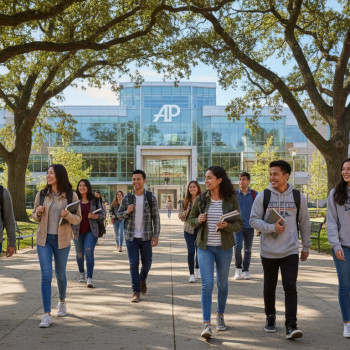Introduction — Why AP Exams Matter for Ambitious Students
If you’re a high school student aiming high — dreaming of studying at the University of Tokyo (Todai) — you probably already know AP (Advanced Placement) exams are a powerful credential. They show academic rigor, discipline, and a readiness for university-level work. But the road from AP classroom to a Tokyo lecture hall isn’t a straight line: there are pathways, caveats, and local rules to understand. This article walks you and your family through how AP scores intersect with admission and credit opportunities at the University of Tokyo, what constraints to expect, and how to design an AP-centered strategy that gives you the best chance of success.
Who This Guide Is For
This guide is written for prospective international students — and their parents — who use AP exams as part of their academic profile and are seriously considering the University of Tokyo. It’s friendly, practical, and grounded in real-world experience: not a policy manual, but a compass to help you navigate admission expectations and credit possibilities while preparing effectively.

Big Picture: AP Exams, Admissions, and International Universities
AP exams were designed to give motivated high school students access to college-level content and, in many systems, to earn credit or advanced placement. For admissions committees worldwide — including those at leading Japanese universities — AP results communicate academic strength. But institutions differ in how they treat AP scores: some grant course credit or exempt students from introductory courses; others primarily use AP scores as evidence of academic preparation without granting formal university credit.
At globally selective schools, including the University of Tokyo, admission decisions rely on a holistic assessment: school grades, standardized tests (when required), statement of purpose or essays, teacher recommendations, and — in some cases — subject-specific examinations or entrance exams. AP scores are valuable evidence in that bundle, but they rarely substitute entirely for local application requirements.
Pathways: How AP Scores Can Help You Get Into the University of Tokyo
1. Strengthening Your Academic Profile
Competitive applicants to the University of Tokyo often demonstrate advanced coursework in the subjects they want to study. AP exams in Calculus, Physics, Chemistry, Biology, Statistics, English Language and Composition, and other rigorous subjects provide clear proof of preparation. High AP scores (4s and 5s) are compelling signals that you can handle demanding coursework.
2. Subject Matching — Align APs With Your Intended Major
If you plan to apply to the Faculty of Engineering, natural sciences, or economics, focus AP efforts on closely aligned subjects — Calculus AB/BC, Physics C, Chemistry, Microeconomics/Macroeconomics, and Statistics. For humanities or social sciences, AP English, History, and languages can be compelling. A targeted AP plan trumps a scattered one: admissions officers prefer depth and alignment over a long list of unrelated APs.
3. Demonstrating International Readiness
Beyond subject knowledge, APs show you’ve engaged with curriculum modeled on U.S. university standards. This matters for Todai’s international programs and for selection committees evaluating cross-border applicants who haven’t followed Japan’s traditional preparatory route.
Constraints: What AP Scores Usually Won’t Do
1. Don’t Count On Automatic Credit
Unlike many U.S. universities, top international institutions — including major Japanese universities — often reserve credit decisions for their internal review. While exceptional AP scores can sometimes influence placement, the University of Tokyo more commonly uses its own entrance examinations, faculty evaluations, and curriculum mapping to determine placement. In short: expect AP scores to strengthen your application rather than guarantee course credit.
2. Entrance Exam Requirements
One major constraint is the prevalence of entrance exams. Todai historically relies on rigorous entry procedures, which might include written examinations, interviews, or portfolio reviews depending on the program. APs don’t replace those requirements in many cases. Even when a program offers an international admissions pathway, they often require additional assessments or a thorough review of your transcript and essays.
3. Varying Departmental Policies
Each faculty may treat APs differently. Some departments welcome AP evidence as part of a holistic evaluation; others are bound to domestic standards and expect applicants to meet those criteria first. Don’t assume uniform acceptance across the university — check your intended faculty’s admissions guidance.
Practical Steps: How to Use AP Exams Strategically
1. Research Early and Often
Start by mapping the exact admissions pathway for your intended program — whether you apply through a global or international admissions route or through standard procedures. Timing matters: application windows, exam dates, and score-sending deadlines can affect which AP exam session you choose. Use AP score sends strategically (you typically get one free send per year) and plan early so your scores arrive by application deadlines.
2. Choose AP Subjects With Purpose
Select AP courses that align with your major’s subject matter. If you’re applying for engineering, AP Calculus AB/BC and Physics C are high-impact choices. For economics, Microeconomics, Macroeconomics, and Calculus are meaningful. If you plan to apply to language or humanities tracks, put your best effort into AP English, History, or language exams. Depth wins over breadth.
3. Balance Scores With Other Application Elements
Strong AP scores are persuasive, but competitive applications also need strong school grades, thoughtfully written personal statements, and clear evidence of intellectual curiosity. Highlight research projects, summer programs, or independent study that complements your AP coursework. Admissions officers like to see APs integrated into a coherent academic narrative — not just a list of tests.
4. Use APs for Placement Conversations
Even if APs don’t guarantee credit, they can open conversations about placement. When you receive an offer, contact the department’s student services or admissions office to ask whether specific AP scores might grant exemptions or advanced standing. This is especially effective when you can point to close curricular alignment (for example, AP Calculus BC covering material tested in first-year calculus).
5. Prepare for Entrance Exams and Interviews, Too
If the program requires a separate entrance exam or interview, don’t let AP preparation crowd out time needed for those elements. Design a calendar that accommodates both: AP practice throughout the year and focused prep for entrance exams in the months prior to the application timeline.
Example Timeline: Two-Year AP Strategy for Todai Aspirants
Below is a realistic example of how a sophomore-to-senior timeline might look. Adapt the schedule to your own exam sessions, school calendar, and application deadlines.
| When | What | Why |
|---|---|---|
| Sophomore Year (Spring–Summer) | Choose target majors; begin AP course selection; join research clubs | Early subject alignment; builds depth and extracurricular narrative |
| Junior Year (Year-round) | Take 1–3 AP exams (core subjects); collect strong recommendations; begin essay drafts | Strong junior-year APs are academically persuasive for admissions |
| Senior Year (Fall–Winter) | Finish remaining AP exams where helpful; finalize essays and applications; prepare for any entrance exams | Completes AP profile; ensures scores are ready for application review |
| After Offers (Spring) | Inquire about placement/credit for AP scores; provide official score reports | Potential for placement adjustments or exemptions |
Study Techniques: How to Earn AP Scores That Matter
1. Understand the Exam, Don’t Just Memorize
AP success is about mastering concepts and exam structure. Spend time with Course and Exam Descriptions — they outline the weighting and skills tested — and work backward from there. Do timed practice exams to build stamina and exam-specific strategies.
2. Create a Targeted Study Calendar
- Block weekly time for content review and practice questions.
- Alternate new content with regular cumulative reviews to avoid forgetting material.
- Use mock exams under timed conditions once per month in the final three months.
3. Use Active Learning Methods
Teach concepts to a friend, create flashcards for key formulas and vocabulary, and write brief summary notes after each study session. Active recall and spaced repetition are scientifically proven to improve retention.
4. Seek Personalized Feedback
Targeted, individualized help can dramatically accelerate progress. Sparkl’s personalized tutoring — with 1-on-1 guidance, tailored study plans, expert tutors, and AI-driven insights — can fit naturally here: it helps students strengthen weak areas, practice exam-style questions, and refine time management on a personal schedule.
Realistic Expectations: Interpreting AP Scores in the Context of Todai
High AP scores (4–5) enhance your academic profile and can be persuasive evidence of preparation. However, keep the following realistic expectations in mind:
- APs strengthen an application but seldom replace formal entrance exams.
- Even with high AP scores, individual departments have discretion in awarding exemptions.
- Acceptance depends on the full portfolio — grades, essays, recommendations, entrance exams, and sometimes interviews.
Common Questions Students Ask
Will AP scores give me credit for first-year courses?
Sometimes — but not guaranteed. Many international institutions prefer to evaluate placement internally. After admission, contact the department to ask about exemption procedures and the documentation required, such as score reports and course syllabi.
Can AP scores replace language proficiency tests?
AP English or AP language exams can demonstrate advanced English skills, but they don’t always replace formal TOEFL or IELTS requirements. Check specific admissions policies for language proof; many universities require standardized language tests unless the student has a qualifying exception.
How many AP exams should I take?
Quality trumps quantity. Take 3–6 AP exams that align with your major and where you can realistically aim for scores of 4 or 5. A handful of high-scoring, high-relevance APs is more effective than a long list of mediocre scores.
Case Studies: Approaches That Worked
Here are two short, illustrative profiles of students who used AP strategically while applying to competitive international programs (anonymized and composite):
- Sora — Engineering Aspirant: Focused on AP Calculus BC and Physics C, took additional independent study in programming, scored 5s in both AP exams. Balanced AP prep with mock entrance exams for math-based selection. After admission, provided AP score reports and received placement in an advanced calculus seminar.
- Amara — Social Science Applicant: Built strength in AP Microeconomics, AP Macro, and AP Statistics, scored 4s and 5s. Used APs to frame research interests and wrote a focused personal statement about economic modeling she explored in a summer project. The department valued the coherence of her academic narrative.
Practical Checklist Before You Apply
- Confirm the exact admissions route and deadlines for your intended faculty at the University of Tokyo.
- Decide which AP exams align best with your major and strengths.
- Create a study timeline that balances AP prep with entrance-exam practice.
- Plan your official AP score sends to arrive before application review dates.
- Prepare essays and recommendations that connect AP coursework to academic interests.
- After an offer, ask the admissions office about potential placement or credit for high AP scores and what documentation they require.
When to Seek Extra Help — and How to Choose It
Most students benefit from targeted support at two points: during AP preparation and when translating AP achievement into a compelling application. If you struggle with a concept or need disciplined practice, one-on-one tutoring can help avoid wasted hours on ineffective study habits. Look for tutors who can tailor plans to your learning style and goals, provide realistic exam strategies, and help you integrate AP work into your broader application narrative. Sparkl’s personalized tutoring offers those tailored study plans and AI-driven insights to help pinpoint weaknesses and track progress — but choose any service that offers clear, measurable outcomes and a good match with your learning preferences.
Final Thoughts — Combine Ambition With Strategy
AP exams are a wonderful instrument in the toolbox of any student aspiring to elite universities like the University of Tokyo. They signal rigor, mastery, and initiative. But success requires more than high scores: it needs alignment (AP subjects matched to major), timing (scores available when applications are reviewed), and narrative coherence (how those APs fit into your academic story).
Plan early. Focus deeply. Use high-quality, personalized support where it drives the most improvement. And remember: APs don’t replace the whole application — they enhance it. Combined with thoughtful essays, strong recommendations, and preparedness for entrance exams, AP success can be an important part of a competitive, authentic application to Todai.

Resources to Keep Handy (What to Ask and Where to Look)
When you begin the formal application process, have these items ready to streamline your interactions with admissions and to make the most of your AP results:
- Official AP score reports (ordered to arrive before any application deadlines or immediately after acceptance when discussing placement)
- Course syllabi or briefs showing curricular overlap between your AP course and university-level courses
- A concise portfolio or summary of research projects, labs, or significant coursework that complements AP topics
- Questions for admissions about whether APs can be considered for placement or credit and the formal steps for requesting exemptions
Closing Advice for Students and Parents
Preparing for the University of Tokyo is a marathon, not a sprint. Use AP exams to build credibility and confidence, but don’t let them narrow your options. Stay curious, pursue authentic intellectual interests, and keep your file well-rounded. Parents: support consistent study habits, encourage targeted coaching when needed, and help your child manage timelines and paperwork — those practical details often make the difference between a stressful application and a smooth one.
For students who want a structured, individualized approach, consider combining disciplined self-study with occasional expert guidance. Sparkl’s 1-on-1 tutoring and AI-driven insights can be a practical complement to school resources — especially when you need focused work on weak spots or help aligning AP preparation with an international admissions strategy.
Final Encouragement
Reaching for the University of Tokyo is ambitious and admirable. With intentional AP choices, realistic expectations, and disciplined preparation, you’ll give yourself the best possible chance. Keep learning, stay resilient, and let each AP exam be one step toward a university experience that’s worth the effort.
















No Comments
Leave a comment Cancel